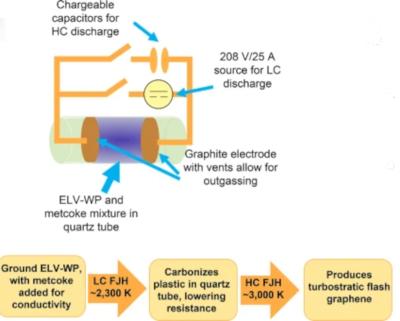Researchers from Rice University and Ford Motor Company are working together on turning plastic parts from end-of-life vehicles into graphene, via the university’s flash Joule heating process.

The Rice lab of chemist James Tour introduced flash Joule heating in 2020 to convert coal, waste food, plastic and other materials into graphene.
Huge amounts of plastic are found in end-of-life vehicles, and responsible disposal is crucial as it could end up in a landfill for a very long time. The researchers reported in their recent work on an upcycling process for dismantled and shredded end-of-life waste plastic into flash graphene using flash Joule heating.
The goal of the project, led by Tour and graduate student and lead author Kevin Wyss, was to reuse that graphene to make enhanced polyurethane foam for new vehicles. Tests showed the graphene-infused foam had a 34% increase in tensile strength and a 25% increase in low-frequency noise absorption. That’s with only 0.1% by weight or less of graphene.
"Ford sent us 10 pounds of mixed plastic waste from a vehicle shredding facility. It was muddy and wet. We flashed it, we sent the graphene back to Ford, they put it into new foam composites and it did everything it was supposed to do. Then they sent us the new composites and we flashed those and turned them back into graphene. It’s a great example of circular recycling", said Prof. James Tour.
To test whether end-of-life, mixed plastic could be transformed, the Rice lab ground the shredder fluff made of plastic bumpers, gaskets, carpets, mats, seating and door casings from end-of-life F-150 pickup trucks to a fine powder without washing or pre-sorting the components.
A life-cycle analysis (LCA) of the result involved comparing graphene from flashed car parts to that produced by other methods, and evaluating recycling efficiency. Their results showed flash Joule heating produced graphene with a substantial reduction in energy, greenhouse gas emissions, and water use when compared to other methods, even including the energy required to reduce the plastic shredder fluff to powder.

